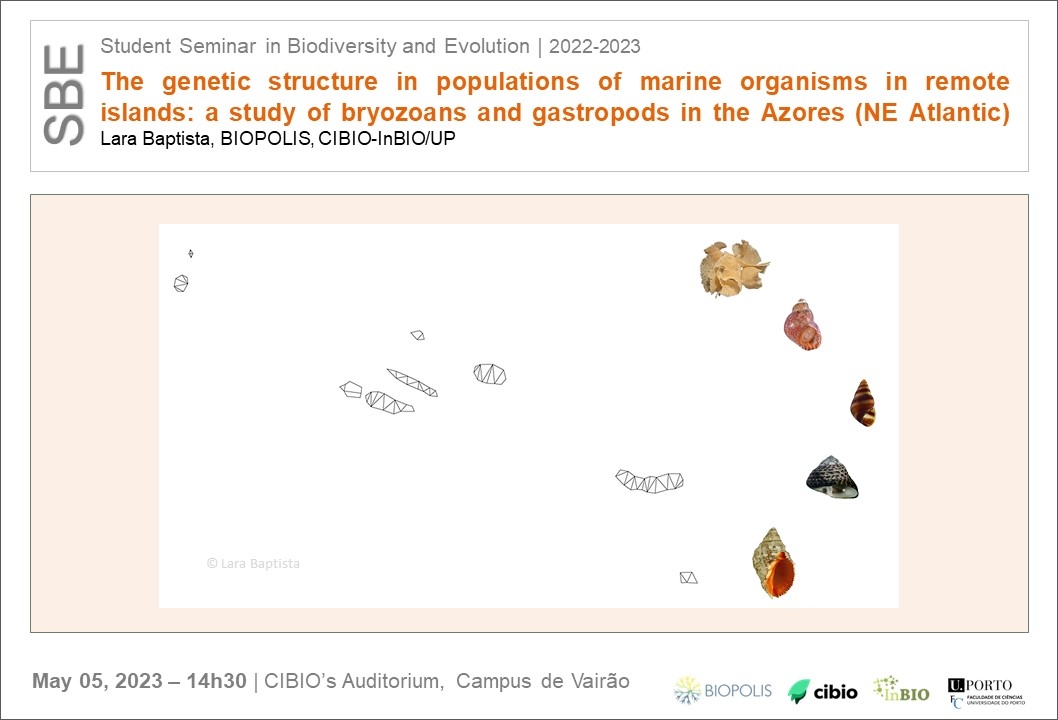The genetic structure in populations of marine organisms in remote islands: a study of bryozoans and gastropods in the Azores (NE Atlantic)
05 May 2023 - Lara Baptista, BIOPOLIS, CIBIO-InBIO/UP | 14h30 | CIBIO’s Auditorium, Campus de Vairão

STUDENT SEMINAR IN BIODIVERSITY AND EVOLUTION
For marine invertebrates, the ability to cross geographical barriers posed by deep-waters and sea-surface circulation is intrinsically linked to their larval development, with important biogeographical and evolutionary implications. Research on marine island biogeography is fuelled by the arrival of marine invertebrates to remote areas, in an attempt to explain how connectivity is maintained under such unique conditions. Therefore, and using the Azores Archipelago as a proxy for remote volcanic oceanic islands, marine biodiversity and biogeographic mechanisms were studied for gastropod and bryozoan species with different types of larval development based on a combination of mitochondrial and nuclear (including microsatellite) markers. Theoretical expectations related to larvae type were tested with gastropod species of the family Rissoidae Gray, 1847 and Stramonita haemastoma (Linnaeus, 1767), reinforcing the usefulness of marine invertebrates with non-planktotrophic larvae as ideal subjects in the field of (palaeo)biogeography. Factors shaping the population structure of marine invertebrates with non-planktotrophic larvae were explored with the gastropods Cingula trifasciata (J. Adams, 1800) and Phorcus sauciatus (Koch, 1845), as well as the sessile bryozoan genus Reteporella Busk, 1884. For intertidal species, the major forces shaping the frequency and timing of gene flow are the life stages at which rafting occurs, habitat type, small-scale oceanographic currents, and extreme weather events, whilst random chance events promote occasional long-distance dispersal. Studies in the genus Reteporella provided insights into the processes of diversification of species with large bathymetrical range, as ecological differentiation associated with bathymetry and signatures of interspecific hybridization events were detected with molecular datasets. Several biotic and abiotic factors interact differently to shape the diversity and evolution of marine invertebrate species with non-planktotrophic larvae within and outside the Azores, contributing to the role of these islands as centres of diversification in the middle of the ocean.
Lara Baptista (LB) graduated in Genetics and Biotechnology at the University of Trás-os-Montes and Alto Douro in 2015 and completed her MSc in Biodiversity, Genetics and Evolution at the University of Porto, in close association with CIBIO-InBio, in November 2017. In October 2018, LB started her PhD in Biodiversity, Genetics and Evolution with a project focused on the evolution and population dynamics of marine invertebrates in remote islands, with a special emphasis in bryozoans and gastropods in the Azores Archipelago. Currently, LB is interested in applying her knowledge in population genetics and phylogenetics to unravel factors shaping long-distance and intra-archipelagic dispersal and consequent biogeographical patterns of marine invertebrates, namely the role of ocean-currents, habitat, and periodic climatic changes. Since 2009, LB has integrated > 15 international workshops ‘Palaeontology in Atlantic Islands' and the BIODIAZ mission on board of the RV Metero, valuably contributing to her fieldwork experience in geology, palentology, and biology. LB has (co)authored 13 peer-reviewed publications, two books, and two technical reports. Moreover, LB has delivered over 20 oral communications and four posters in international and national conferences/workshops and five invited communications (including outreach events).
[Host: Manuel Curto, Plant Biology - PLANTBIO]